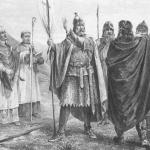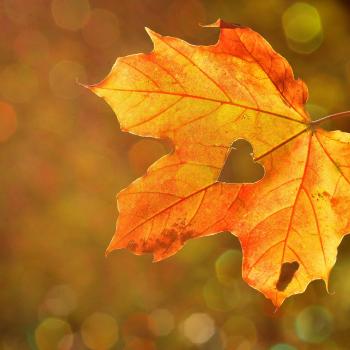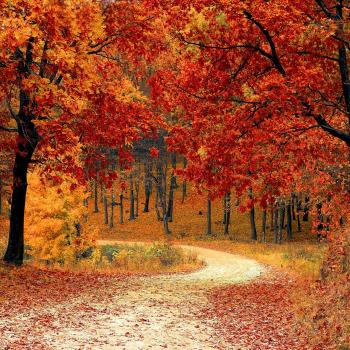I thought I had said enough about the whole Mabon thing years ago, but John Beckett’s recent post got me riled. Although he did a great job of covering how we got into this mess in the first place, his tone — specifically labelling any complaints about the use of “Mabon” for the Autumn Equinox as “hate” — felt like an attempt to trivialize objections and quash further debate. I agree that such debates should remain friendly, but the quotes John Beckett included in his post sounded calm and reasonable. I couldn’t detect any hate in them at all. The whole thing read as if he was saying “Yeah, ten years ago you could show you were cool by saying we shouldn’t call it Mabon. Now, you can be cool like me by saying it doesn’t matter.”
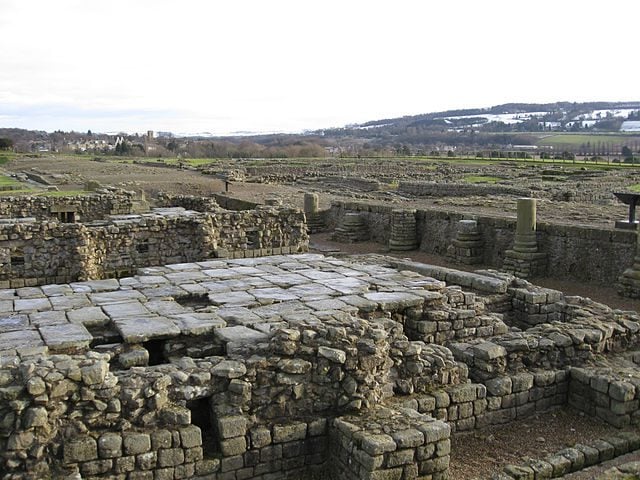
As you probably guessed, I think it does matter, and here’s why:
Mabon is a deity.
His one surviving myth is in the Welsh tale Culhwch and Olwen. In this story, our hero, Culhwch must accomplish several seemingly impossible tasks in order to win the hand of Olwen, a giant’s daughter. Among these tasks is the killing of an enormous boar. However, he learns that he has no hope of killing this boar without the help of Mabon. Unfortunately, Mabon has been missing from his mother, Modron, since he was three days old, and is very hard to find. There is a long and involved search. Finally, with the help of Culhwch’s cousin, King Arthur, Mabon is found in an underwater prison, is freed, and is able to help Culhwch hunt the boar, and eventually win his bride. (This is just a quick sketch of the whole story, which is particularly long winded.)
There is also evidence that Mabon, or Maponus (sometimes spelled Maponos) was an important deity to Celts on the continent and in Britain. There are two inscriptions to Him in Gaul (modern France), both associated with healing springs, which may imply that he has an association with water or healing. Of course, where we find inscriptions we always find Romans, because the Celts, themselves, didn’t leave inscriptions, or at least not unless they were influenced to do so by Romans.
There are eight more inscriptions in Britain, all associated with Roman camps in the north, mostly near Hadrian’s wall. At one of these sites, a Roman camp near Corbridge, a beautiful head carved in Celtic, rather than Roman, style was found, and is believed to depict Maponos. Corbridge must have been a centre for the worship of Maponus, as there were four separate inscribed altars there.
The Romans had a habit of adopting indigenous deities wherever they went, and they usually combined or conflated them with whichever of their own gods they considered similar. However, they weren’t too particular about getting a close match. So, when I tell you that they paired Maponos with Apollo, I would urge you not to jump to the conclusion that the two gods have all the same attributes, and certainly not that they are the same deity.
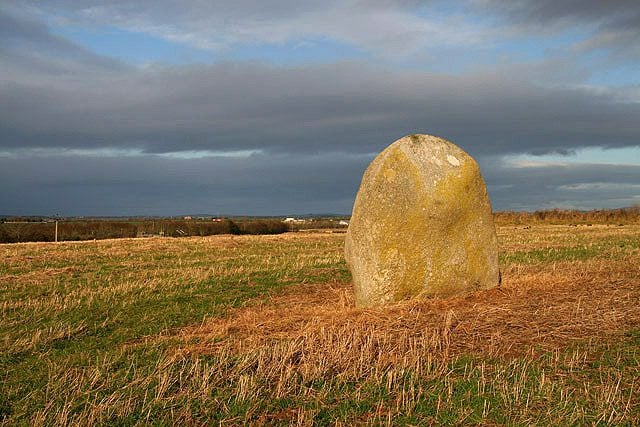
cc-by-sa/2.0 – © Walter Baxter – geograph.org.uk/p/1055490
There is also evidence of Maponus as Mabon in a non-Roman context not far from these Romano-British sites, just over the border into southwestern Scotland. The Clachmaben Stone is a megalith near Gretna, which was once part of a stone circle. About twenty miles to the northwest is the small town of Lochmaben, which is bordered on three sides by lochs. Mabon’s name is recorded as being localised to this area by the 7th century, but it is reasonable to think that it was used there earlier. The area in which most of the British sites occur is firmly within the ancient kingdoms of Rheged and Stratclyde, which, for many centuries, shared a common Brythonic language and culture with what we now call Wales. This makes it logical to think that all these different pieces of evidence: the myth, the inscriptions and the place names can be traced to one deity.
Mabon/Maponos is a deity. In my book that makes Him both important and worthy of a certain reverence or respect. Aiden Kelly, the chap who decided to call this holiday Mabon in the 1970s, had his own rationale for choosing Mabon. He was looking for a “northern European” deity who fit the idea of a divine prisoner, similar to Persephone. Kelly goes on to say, “It would have been aesthetically better to have found a Saxon name, but [there wasn’t one] so I picked ‘Mabon’.”
That approach doesn’t seem particularly respectful to me, but two things would have improved the situation. First, Kelly and his cohorts, and the Pagan community in general, could have chosen to honour the god Mabon at the Autumnal Equinox, rather than just turn it into Pagan Thanksgiving. Instead, they changed the name of a god into an offhand label for a spoke in our modern Wheel of the Year, and buried Mabon Himself under a pile of late wheat and early pumpkins.

Umberto Cancedda via Pexels. CC0 License.
This taking of the personal name of a deity and applying it to a day doesn’t even make logical grammatical sense here, and that’s the second thing that bothers me. The feast of the god Saturn is called Saturnalia. The day named after Woden is called Wodensday/Wednesday. The big holiday of you-know-who is called Christmas. The clue that we are honoring a god on these days is in the word. Would it not have been more respectful to call it Maponalia or Mabon’s Day or something like that? I guess that didn’t have the same slick ring to it, but people are willing to struggle through Samhain and Lughnasadh, so these should have been a walk in the park. That type of name would have led people to ask, “Who’s Mabon?” It would have left an opening to teach new Pagans about the god Mabon, and why He got picked for these new duties. He probably wouldn’t have minded. In my experience, the gods appreciate our attention.
I don’t hate Aiden Kelly, or any of the people who call the upcoming holiday Mabon without knowing why. After all, they are just following a custom they learned from someone else. Neo paganismis still a very young set of religions. We still have time to correct some of our sillier mistakes, rather than turning them into a legacy. I’m not speaking from a place of hate, here, I’m speaking from a place of loving my gods. (Something John Beckett talks about all the time.) I’m speaking from a place of respecting my fellow Pagans enough to want them to have an accurate map to work with. Most Pagans I meet want an accurate map, because it’s much easier to make sense of your journey that way.




